Paper
For submission of articles or Working Papers to CEsA, please send an email to:
comunicacao@cesa.iseg.ulisboa.pt
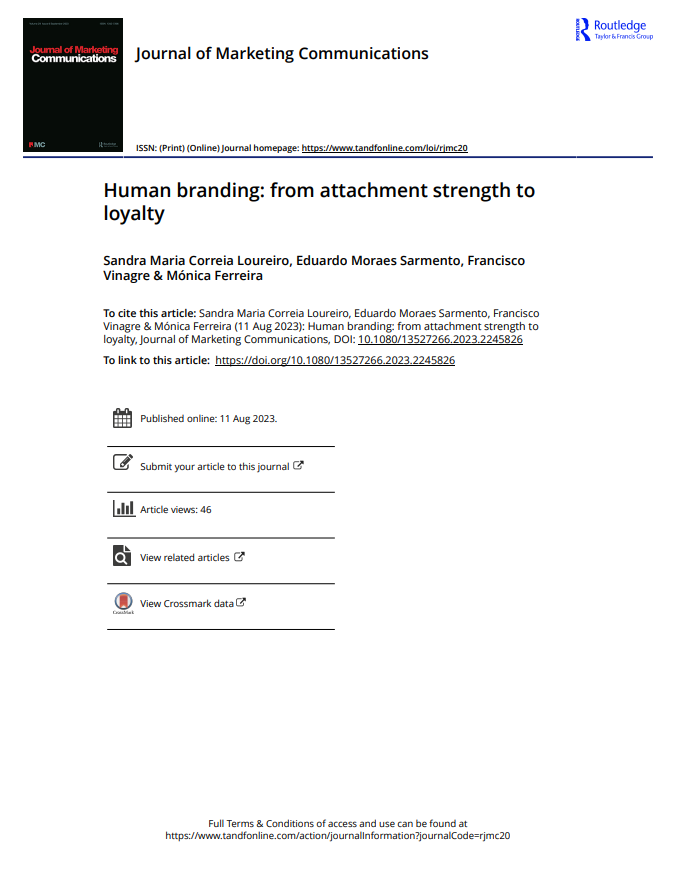
Human Branding: From attachment strength to loyalty
Abstract:
Human branding is everywhere and within every individual. With the increase in the importance of technology and social media, human branding becomes increasingly relevant, but it is still a branding concept with much room to explore. Celebrities, such as actors and athletes, are the greatest examples of human brands, and with social media managing public image is key to success. This study aims to analyze the process by which attachment strength influences loyalty through intimate and public engagement. Thus, a sample of 321 participants, collected through social media platforms, allowed us to treat data and test the hypotheses of the proposed model. Relatedness is the most relevant driver of attachment strength and the flow from attachment to loyalty through public engagement.
Quotation:
Loureiro, Sandra Maria Correia … [et al.] (2023) “Human Branding: From attachment strength to loyalty”. Journal of Marketing Communications, DOI: 10.1080/13527266.2023.2245826
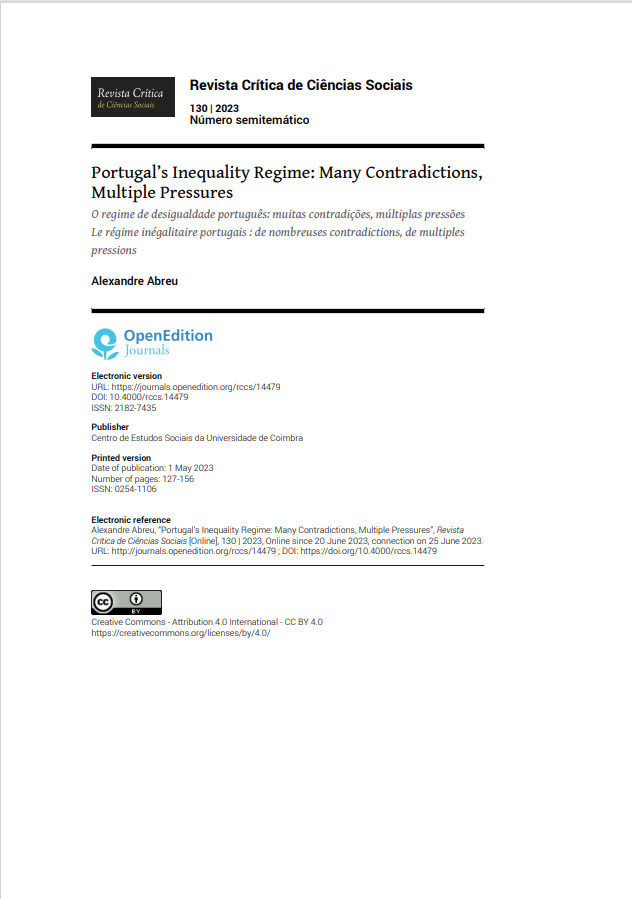
Portugal’s Inequality Regime: Many contradictions, multiple pressures
Abstract:
This paper applies the concept of inequality regime, in the tradition of the Regulation School, to the analysis of the patterns and drivers of socioeconomic inequality in Portugal in the last few decades. Key empirical patterns are identified with respect to income inequality, top and bottom incomes, wealth inequality, monetary poverty and non-commodified provision of basic goods. We then discuss several underlying processes and mechanisms, namely the capital-labour relation, classification struggles, financialisation, redistribution, and welfare, to account for the identified empirical patterns. We conclude that Portugal’s inequality regime is remarkably contradictory and argue that the country’s success in curbing most measures of inequality in recent times is especially vulnerable to a variety of pressures.
Quotation:
Abreu, A. (2023). “Portugal’s Inequality Regime: Many contradictions, multiple pressures”. Revista Crítica de Ciências Sociais, 130:127-156
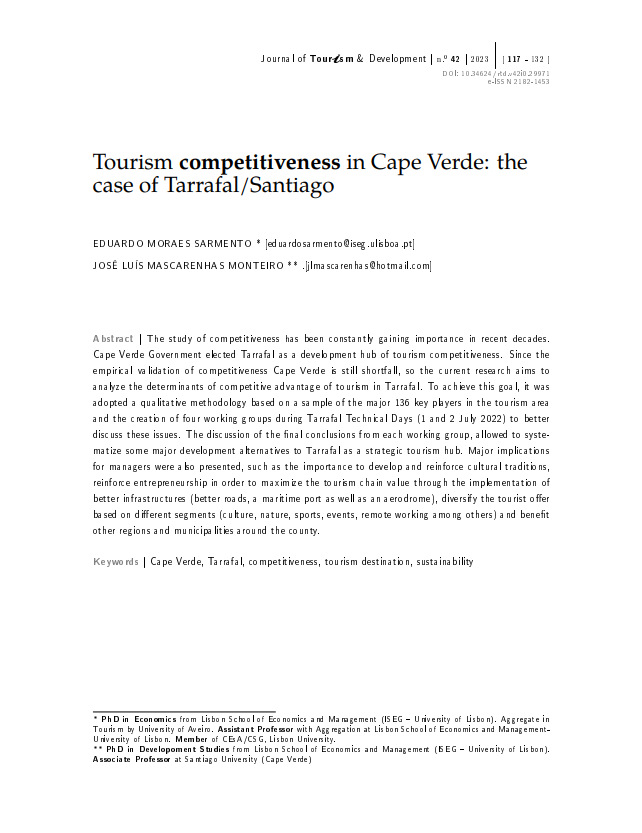
Tourism Competitiveness in Cape Verde: The case of Tarrafal/Santiago
Abstract:
The study of competitiveness has been constantly gaining importance in recent decades. Cape Verde Government elected Tarrafal as a development hub of tourism competitiveness. Since the empirical validation of competitiveness Cape Verde is still shortfall, so the current research aims to analyze the determinants of competitive advantage of tourism in Tarrafal. To achieve this goal, it was adopted a qualitative methodology based on a sample of the major 136 key players in the tourism area and the creation of four working groups during Tarrafal Technical Days (1 and 2 July 2022) to better discuss these issues. The discussion of the nal conclusions from each working group, allowed to systematize some major development alternatives to Tarrafal as a strategic tourism hub. Major implications for managers were also presented, such as the importance to develop and reinforce cultural traditions, reinforce entrepreneurship in order to maximize the tourism chain value through the implementation of better infrastructures (better roads, a maritime port as well as an aerodrome), diversify the tourist o er based on di erent segments (culture, nature, sports, events, remote working among others) and bene t other regions and municipalities around the county.
Quotation:
Sarmento, Eduardo Moraes e José Luís Mascarenhas Monteiro (2023). ” Tourism competitiveness in Cape Verde : the case of Tarrafal/Santiago”. Revista Turismo & Desenvolvimento, 42:117-132
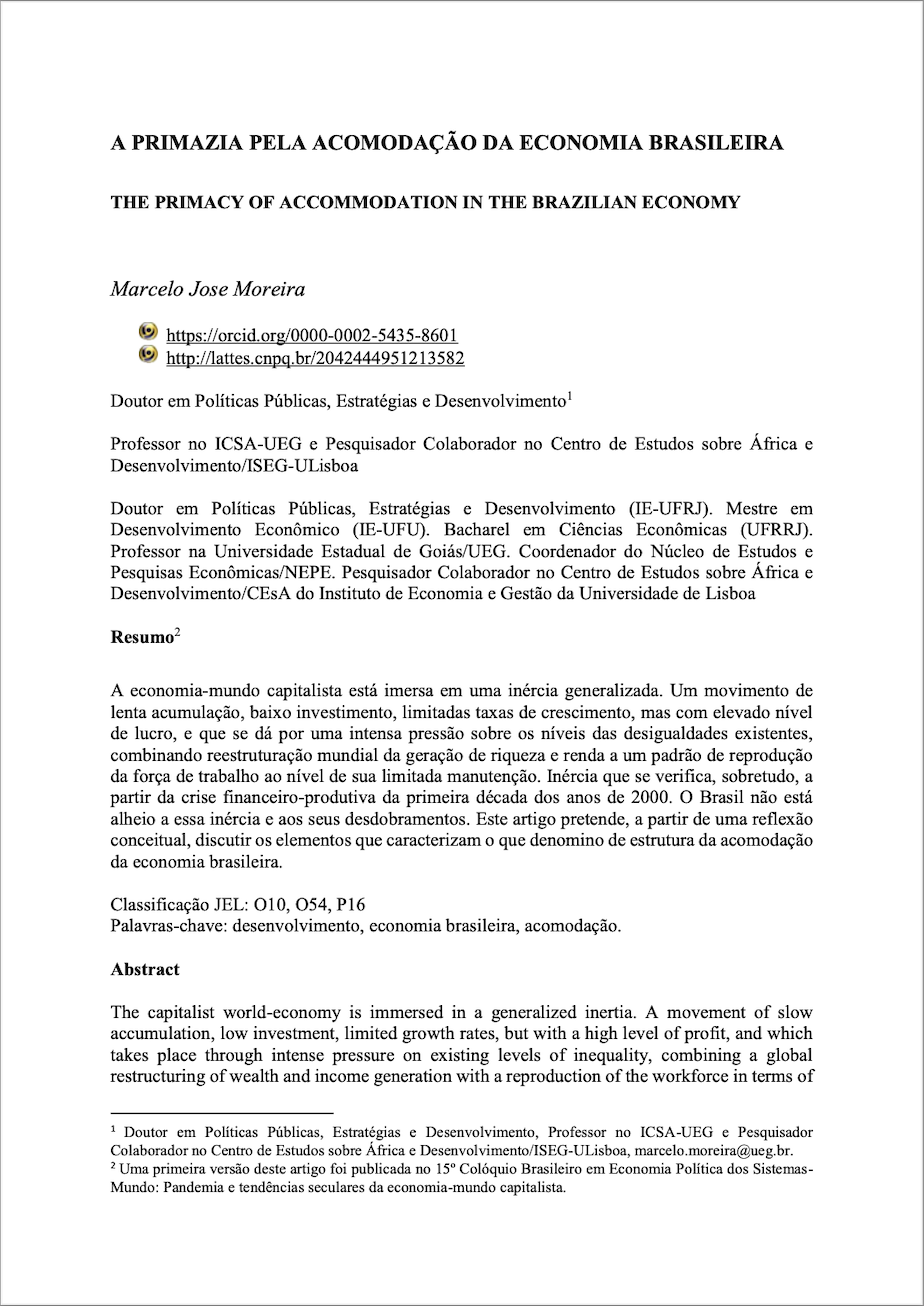
The primacy of accommodation in the Brazilian economy
Abstract:
The capitalist world-economy is immersed in a generalized inertia. A movement of slow accumulation, low investment, limited growth rates, but with a high level of profit, and which takes place through intense pressure on existing levels of inequality, combining a global restructuring of wealth and income generation with a reproduction of the workforce in terms of its limited maintenance. Inertia that can be seen, mainly, from the productive-financial crisis of the first decade of the 2000s. Brazil is not oblivious to this inertia and its consequences. This article intends, from a conceptual reflection, to discuss the elements that characterize what I call the accommodation structure of the Brazilian economy.
Quotation:
Moreira, Marcelo José (2021). “A primazia pela acomodação da economia brasileira”. Revista de Economia da UEG. 17(2), p. 44-65
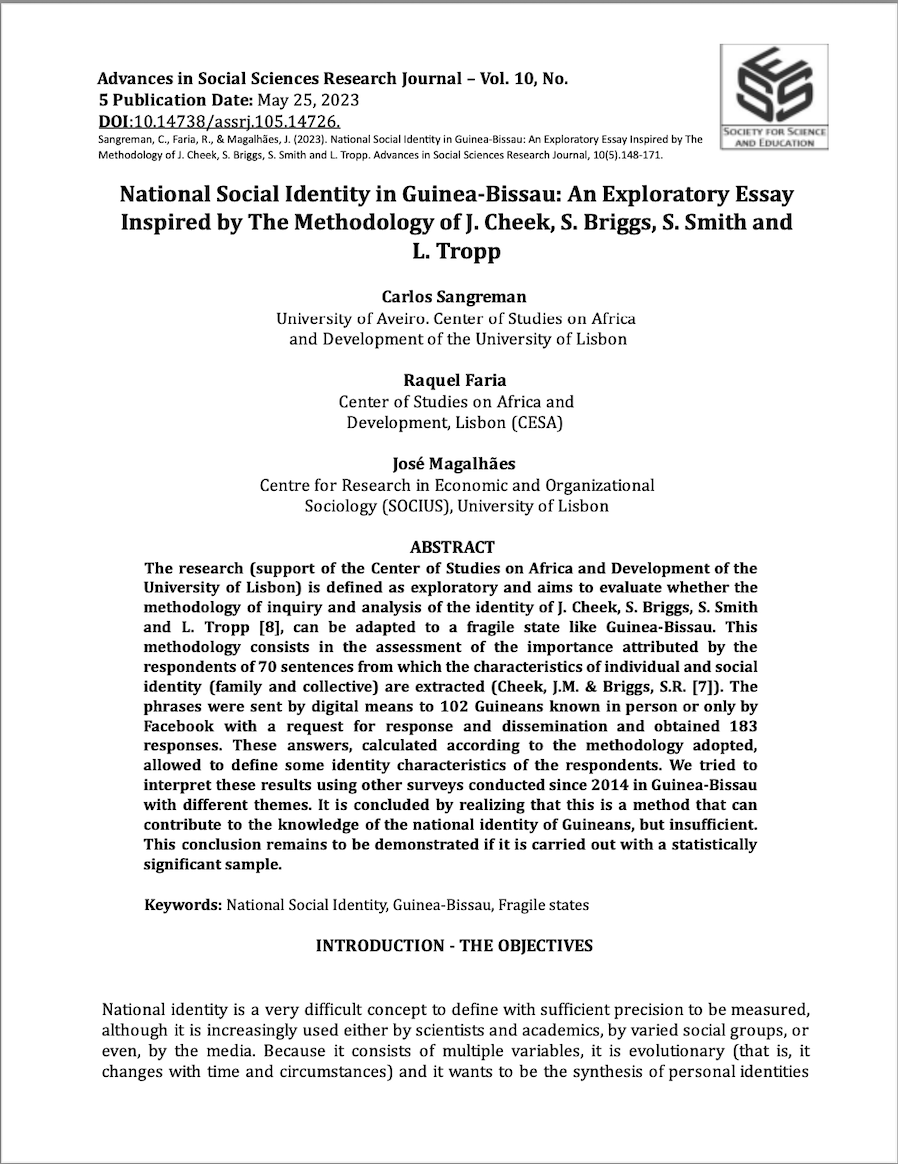
National Social Identity in Guinea-Bissau: An Exploratory Essay Inspired by the Methodology of J. Cheek, S. Briggs, S. Smith and L. Tropp
Abstract:
The research (supported by the Centre for African and Development Studies of the University of Lisbon) is defined as exploratory and aims to evaluate whether the methodology of inquiry and analysis of the identity of J. Cheek, S. Briggs, S. Smith and L. Tropp, can be adapted to a fragile state like Guinea-Bissau. This methodology consists in the assessment of the importance attributed by the respondents of 70 sentences from which the characteristics of individual and social identity (family and collective) are extracted (Cheek, J. M. & Briggs, S. R.). The phrases were sent by digital means to 102 Guineans known in person or only by Facebook with a request for response and dissemination and obtained 183 responses. These answers, calculated according to the methodology adopted, allowed to define some identity characteristics of the respondents. We tried to interpret these results using other surveys conducted since 2014 in Guinea-Bissau with different themes. It is concluded by realizing that this is a method that can contribute to the knowledge of the national identity of Guineans, but insufficient. This conclusion remains to be demonstrated if it is carried out with a statistically significant sample.
Quotation:
Sangreman, C., Faria, R., & Magalhães, J. (2023). National Social Identity in Guinea-Bissau: An exploratory essay inspired by the methodology of J. Cheek, S. Smith and L. Tropp. Advances in Social Sciences Research Journal, 10(5).148-171.
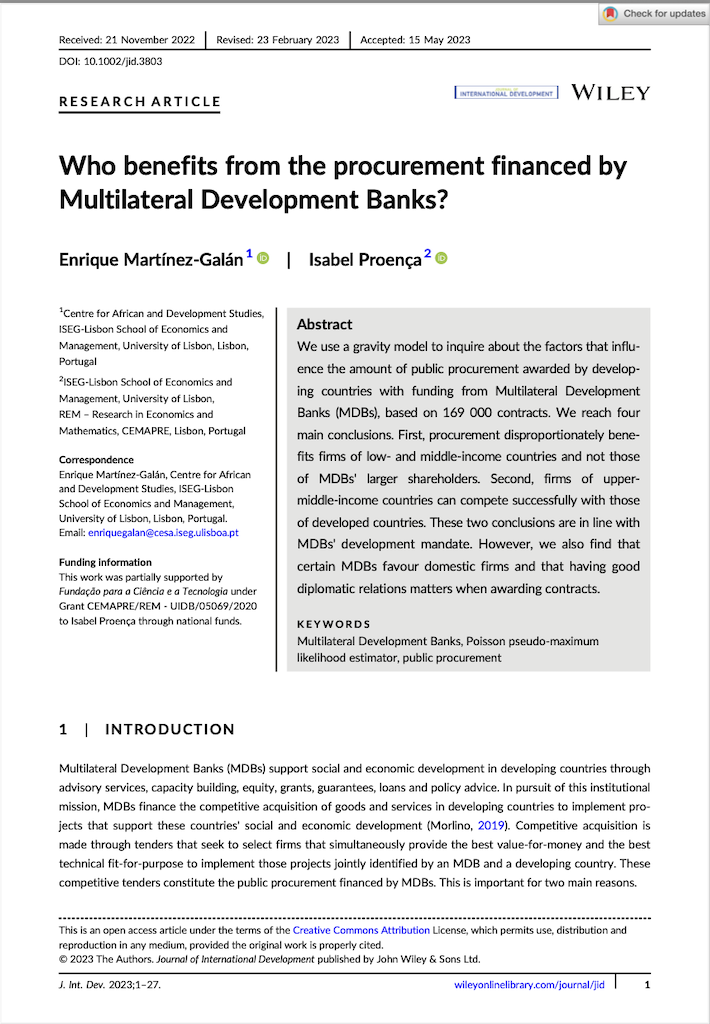
Who Benefits from the Procurement Financed by Multilateral Development Banks?
Abstract:
We use a gravity model to inquire about the factors that influence the amount of public procurement awarded by developing countries with funding from Multilateral Development Banks (MDBs), based on 169 000 contracts. We reach four main conclusions. First, procurement disproportionately benefits firms of low- and middle-income countries and not those of MDBs’ larger shareholders. Second, firms of uppermiddle- income countries can compete successfully with those of developed countries. These two conclusions are in line with MDBs’ development mandate. However, we also find that certain MDBs favour domestic firms and that having good diplomatic relations matters when awarding contracts.
Quotation:
Martínez-Galán, E., e Proença, I. (2023). Who benefits from the procurement financed by multilateral development banks? Journal of International Development, 1– 27. https://doi.org/10.1002/jid.3803
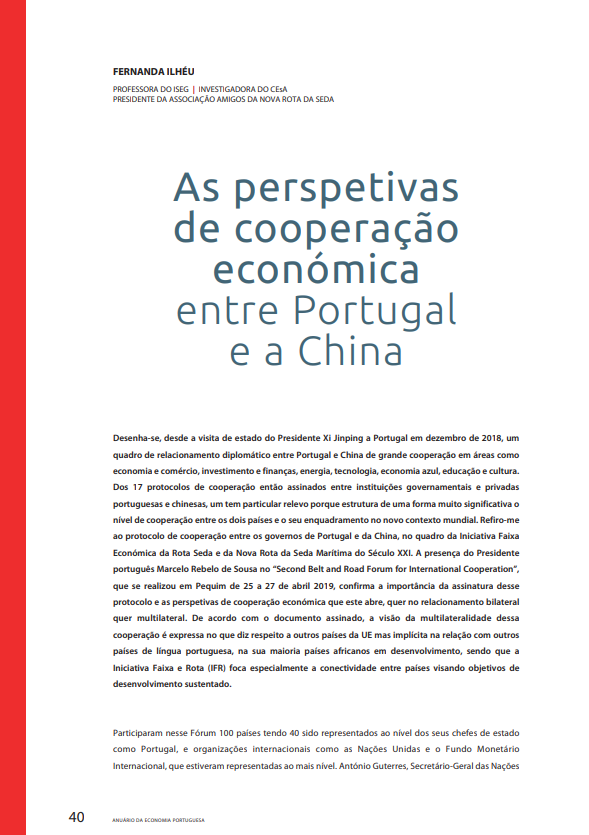
As Perspetivas de Cooperação Económica entre Portugal e a China
Abstract:
As Perspetivas de Cooperação Económica entre Portugal e a China exposes how Since the state visit of President Xi Jinping to Portugal in December 2018, a framework for diplomatic relations between Portugal and China has been established, with a high level of cooperation in areas such as economy and trade, investment and finance, energy, technology, blue economy, education and culture. Of the 17 cooperation protocols signed then between Portuguese and Chinese governmental and private institutions, one is of particular relevance because it structures in a very significant way the level of cooperation between the two countries and its framework in the new global context. I am referring to the cooperation protocol between the governments of Portugal and China, within the framework of the Silk Road Economic Belt Initiative and the New 21st Century Maritime Silk Road. The presence of Portuguese President Marcelo Rebelo de Sousa at the “Second Belt and Road Forum for International Cooperation”, which was held in Beijing from 25 to 27 April 2019, confirms the importance of the signing of this protocol and the prospects for economic cooperation that it opens, both in bilateral and multilateral relations. According to the signed document, the vision of the multilaterality of this cooperation is expressed with regard to other EU countries but implicit in the relationship with other Portuguese-speaking countries, mostly African developing countries, with the Belt and Road Initiative (IFR) focusing especially on connectivity between countries aimed at sustainable development objectives.
Quotation:
Fernanda Ilhéu (2019), As Perspetivas de Cooperação Económica entre Portugal e a China. O Economista-Anuário da Economia Portuguesa, 32ª Edição, Ordem dos Economistas, ISBN 1646-9909, pp:40-45, Lisboa.
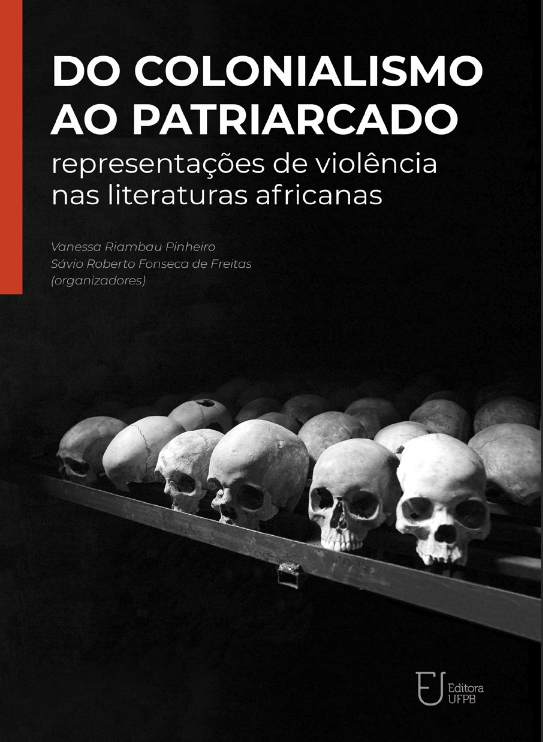
Violência e Morte na poesia de José Craveirinha
Resumo:
In this second article of the journal “Do Colonialismo ao Patriarcado: Representações da Violência nas Literaturas Africanas”, Violência e Morte na poesia de José Craveirinha, Ana Mafalda Leite (CEsA/CSG/ISEG/ULisboa) studies the representation of elements related to violence and death in José Craveirinha’s poetry. The last books by José Craveirinha, published during his life, Babalaze das Hienas (1992) and Maria (1998) deal with the theme of death, apparently from different points of view. In fact, the publication of unpublished books in the last phase of his life included, besides these two books, a first edition of Maria (1988). The previous books, Xigubo, Karingana ua Karingana and Cela 1, which have also been re-edited, are part of the poetic production made during the colonial period. Craveirinha, always writing, but shy of publication, bequeathed us Babalaze and Maria as the result of his writing in post-colonial times, although we know, however, that other material exists, still unpublished. The books in question have in common a similar formal trait, short poems, almost epigrammatic inscriptions, as a result of a daily proximity to the experience of death, on the one hand of the beloved woman, in the case of Maria, and on the other hand of death resulting from the civil war, in the case of Babalaze das Hienas.
Citação:
Leite, Ana Mafalda. “Violência e Morte na poesia de José Craveirinha”. In Do Colonialismo ao Patriarcado: Representações da Violência nas Literaturas Africanas, 33-42. 2020.
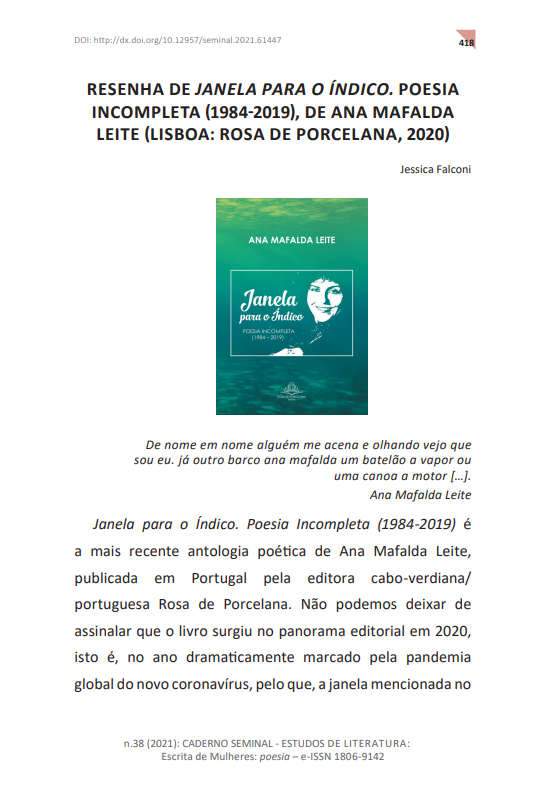
Resenha De Janela Para O Índico. Poesia Incompleta (1984-2019), De Ana Mafalda Leite
Abstract:
Resenha de Janela para o Índico. Poesia Incompleta (1984-2019) focuses on the most recent poetic anthology by Ana Mafalda Leite, published in Portugal by the Cape Verdean/Portuguese publishing house Rosa de Porcelana. We cannot fail to point out that the book appeared on the publishing scene in 2020, that is, in the year dramatically marked by the global pandemic of the new coronavirus, so the window mentioned in the title acquired an even more suggestive sense of freedom and openness. The anthology is organised into nine sections, which correspond to the books previously published by the author, from which a wide and careful selection was made, and a section with two unpublished texts. Thus, this Window witnesses a path of thirty-five years of poetic writing. A journey that is parallel to an equally long and consolidated career as a teacher and scholar of literature and cinema from the five Portuguese-speaking African countries. It is worth mentioning that Ana Mafalda Leite’s poetic writing has been the object of growing appreciation and recognition by the critics and the public. Her poetic texts have been included in various academic publications – in addition to anthologies and literary magazines – such as Itinerâncias and Vozes femininas de África, among others. In 2015 she was awarded the Femina1 prize for her poetic production, and in 2011 her poems were translated into English and published in the volume Stained Glass. Poetry from the Land of Mozambique, organized by Luís Rafael Mitras. It should also be noted that a selection of poems, from Janela para o Índico, will soon be published in Italian translation, on the initiative of Roberto Francavilla.
Quotation:
Falconi, J. (2021). Resenha De Janela Para O Índico. Poesia Incompleta (1984-2019), De Ana Mafalda Leite, Caderno Seminal 38.1, p. 418-443
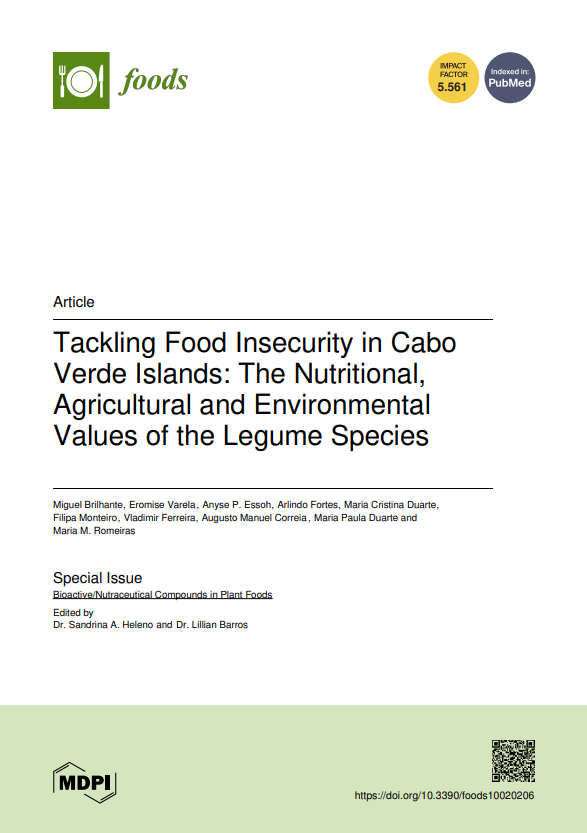
Tackling Food Insecurity in Cabo Verde Islands: The Nutritional, Agricultural and Environmental Values of the Legume Species
Abstract:
Legume species are important food sources to reduce hunger and deal with malnutrition; they also play a crucial role in sustainable agriculture in the tropical dry islands of Cabo Verde. To improve the knowledge of the heritage of plant genetic resources in this Middle Income Country, Tackling food insecurity in Cabo Verde Islands: the nutritional, agricultural and environmental values of the legume species had three main goals: (i) to provide a checklist of food legumes; (ii) to investigate which species are traded in local markets and, based on field surveys, to compare species for their chemical, phenolic, antioxidant, and nutritional composition; and (iii) to discuss the agronomic value and contribution to food security in this archipelago. Our results revealed that 15 species are used as food and 5 of them are locally traded (Cajanus cajan, Lablab purpureus, Phaseolus lunatus, Phaseolus vulgaris, and Vigna unguiculata). The role of these species as sources of important minerals, antioxidants, and nutritional components for food security is highlighted, and the native ones (Lablab purpureus and Vigna unguiculata) stand-out as particularly well-adapted to the climate of these islands, which are already experiencing the adverse effects of climate change. We conclude that the sustainable use of these genetic resources can contribute to the reduction of hunger and poverty, thus meeting some challenges of the Sustainable Development Goals.
Quotation:
Brilhante, M., Varela, E., Essoh, A.P, Fortes, A., Maria Cristina Duarte, M.C., Monteiro, F., Ferreira, V., Correia, A. M., Duarte, M.P; Romeiras, M. M (2021). Tackling food insecurity in Cabo Verde Islands: the nutritional, agricultural and environmental values of the legume species. Nutrients, 13. MDPI. Pag. 17. https://www.mdpi.com/2304-8158/10/2/206





